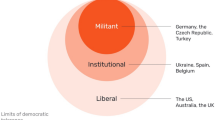Abstract
After the European elections of 2014, the European Parliament managed to seize the power to select the Commission president from the EU heads of state and government. This democratic advance, however, is yet to find its counterpart in the subsequent process of selecting the other commissioners. For one thing, the entitlement to equal representation of all 28 member states hinders any reduction of the Commission to a more workable size. For another, because the right to nominate commissioners rests solely with the national governments, the composition of the Commission primarily reflects the partisan majorities of the Council rather than those of the Parliament, leading to a limited reflection of the president’s mandate in the composition of the Commission. The following article examines how these problems could be resolved. It proposes a moderate amendment to the parity principle to reduce the Commission’s size, a larger pool of candidates from which to select commissioners and the election of candidates by European citizens. The last proposal could even be implemented without any change to the treaties.
Similar content being viewed by others
Notes
Certainly the powers to confirm the Commission as a whole and condone hearings with nominees enable the European Parliament to put pressure on the Commission and the member states in the course of the nomination process and, in the past, the Parliament has even managed to elicit the retraction of a couple of nominees. However, these instances are rare and the Parliament’s role in the nomination process remains by and large confirmatory.
Andrus Ansip (Estonia), Miguel Arias Cañete (Spain), Corina Creţu (Romania), Valdis Dombrovskis (Latvia), Christos Stylianides (Cyprus) and Marianne Thyssen (Belgium).
References
Buchstein, H., & Hein, M. (2009). Randomizing Europe. The lottery as a decision-making procedure for policy creation in the EU. Critical Policy Studies, 3(1), 29–57.
Decker, F. (2012). Electing the Commission president and commissioners directly: A proposal. European View, 11(1), 71–8.
Decker, F. (2014). Die Europäische Union auf dem Weg zur parlamentarischen Demokratie? Aus Politik und Zeitgeschichte, 64(38–9), 3–8.
Klimek, P., Hanel, R., & Thurner, S. (2008). To how many politicians should government be left? Santa Fe Institute Working Paper no. 2008-05-021. Santa Fe.
Parkinson, N. C. (1957). Parkinson’s law and other studies in administration. Cutchogue, NY: Buccaneer Books.
Author information
Authors and Affiliations
Corresponding author
About this article
Cite this article
Decker, F. The pitfalls of parliamentarisation: why the procedure of appointing the European Commission should be changed. European View 13, 319–326 (2014). https://doi.org/10.1007/s12290-014-0321-7
Published:
Issue Date:
DOI: https://doi.org/10.1007/s12290-014-0321-7




